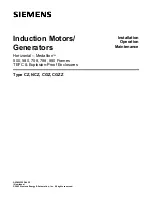
- 8 -
Installation
Check for vertical alignment (parallelism) of coupled
drive as follows:
1. Operate unit until normal temperature is reached
(may require several hours).
2. Shut down motor and lock out switch.
3. Mount dial indicator as in Figure 2.
4. Rotate shaft, noting readings at 0°, 90°, 180°, and
270° (both sides, top, and bottom). If within 0.002
inch total indicator reading, or other limit specified
by the factory, unit is satisfactory for operation.
5. If not within limits, add or remove shims as
required to raise or lower motor.
6. If shims are changed for high temperature
operation, repeat alignment procedure to extent
necessary to assure proper alignment. Document
readings for warranty information.
Figure 2.
Check of Vertical Alignment
Vibration
The standard unfiltered housing vibration limits
measured at no load, uncoupled, and with rigid
mounting are as follows based on the requirements of
NEMA MG1-7.8.
Speed
Velocity, inches/sec peak
1200 – 3600 RPM
0.120
1000 RPM
0.105
900 RPM
0.096
750 RPM
0.079
720 RPM
0.075
600 RPM
0.063
After alignment is complete and foot mounting bolts are
tight, run motor at no load (or minimum possible).
Check for vibration. If excessive vibration exists and
the alignment is acceptable, check foot plane by
loosening one drive end-mounting bolt at a time as
detailed below. This is to be documented for warranty
information. When resiliently mounted, allowed levels
are 25% higher.
Base or foundation rigidity can also affect vibration;
check for resonance in supporting structure.
Recheck alignment after any change in shims and
document alignment readings for warranty information.
Completing Mechanical Installation
After controlling rotor end float and establishing
accurate alignment, it is recommended to drill and
ream the foundation plate and motor feet together for
dowel pins. (See
Doweling
).
Recheck parallel and angular alignment before bolting
the coupling together. Motor shaft should be level
within 0.03 inch after alignment.
Doweling
Doweling the motor (and driven unit) accomplishes the
following:
1. Restricts
movement.
2. Eases realignment if motor is removed from base.
3. Temporarily restrains the motor, should mounting
bolts loosen.
Inserting Dowel Pins
The following procedure is recommended:
a. Check the alignment after the unit has been in
operation approximately one week. Correct as
necessary.
b. Using pre-drilled dowel holes in motor feet as
guides, drill into the mounting base.
c. Ream holes in the feet and base to the proper
diameter for tapered dowel pins. Clean out the
chips.
d. Insert
dowel
pins.
Force Feed Lubrication
If force feed lubrication is used, flush lubrication lines
thoroughly to make sure the lines are clean before
connecting lines to bearing housings. Be sure that
bearing cavities are filled with oil to the proper level
before starting. See motor outline drawing to
determine proper oil level. Be sure that proper oil
pressure and flow are provided by the supply system.
Verify that the oil drain flow agrees with the factory
requirements. The orientation and size of oil drain
piping supplied with the motor must not be altered. Oil
drain piping should be of the same size or larger from
the motor piping to the oil sump. Piping must slope
downward. Pressure build up in the drain line between
the oil sump and the motor bearing housing can lead to
oil leakage. Document readings for warranty
information.










































